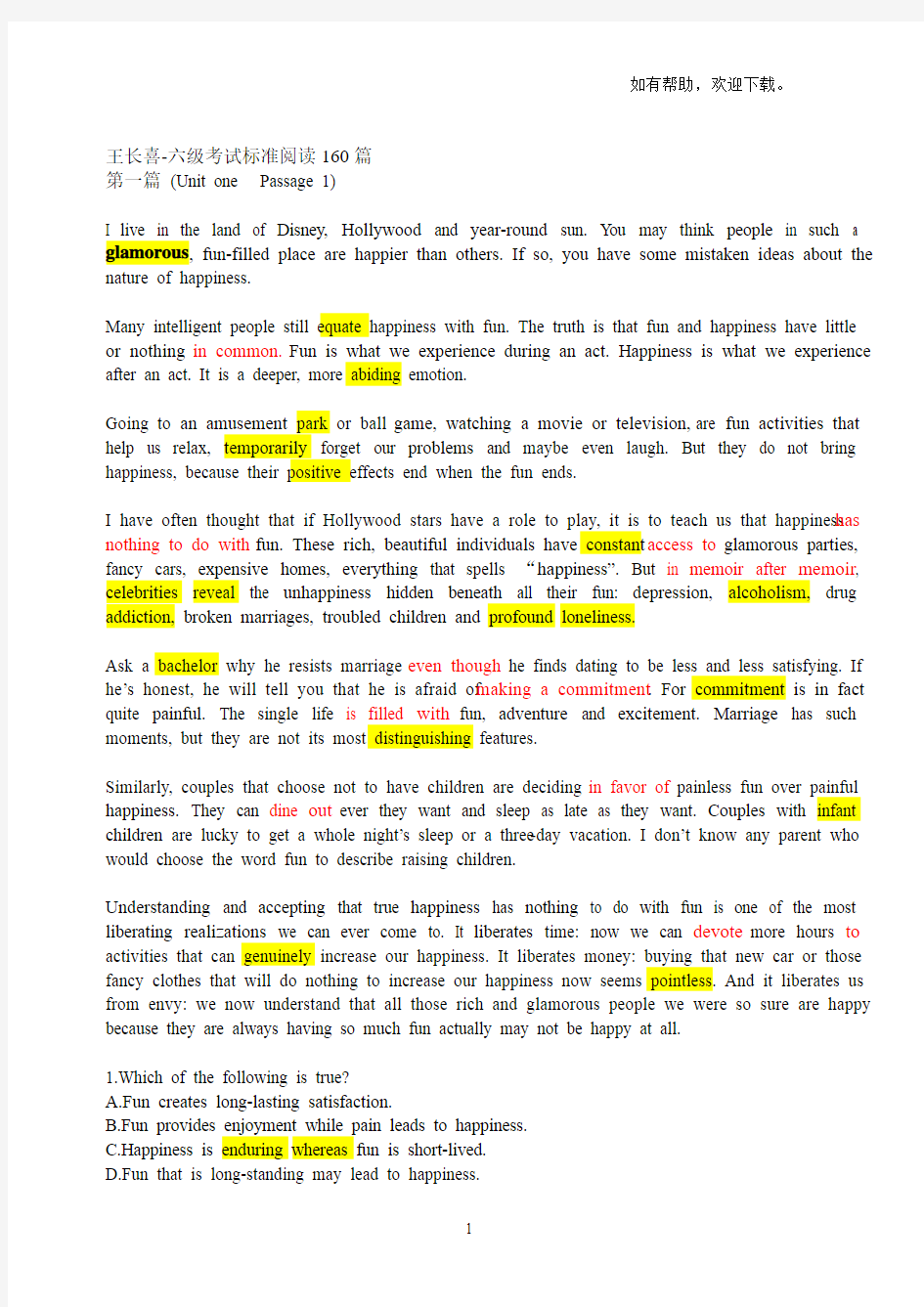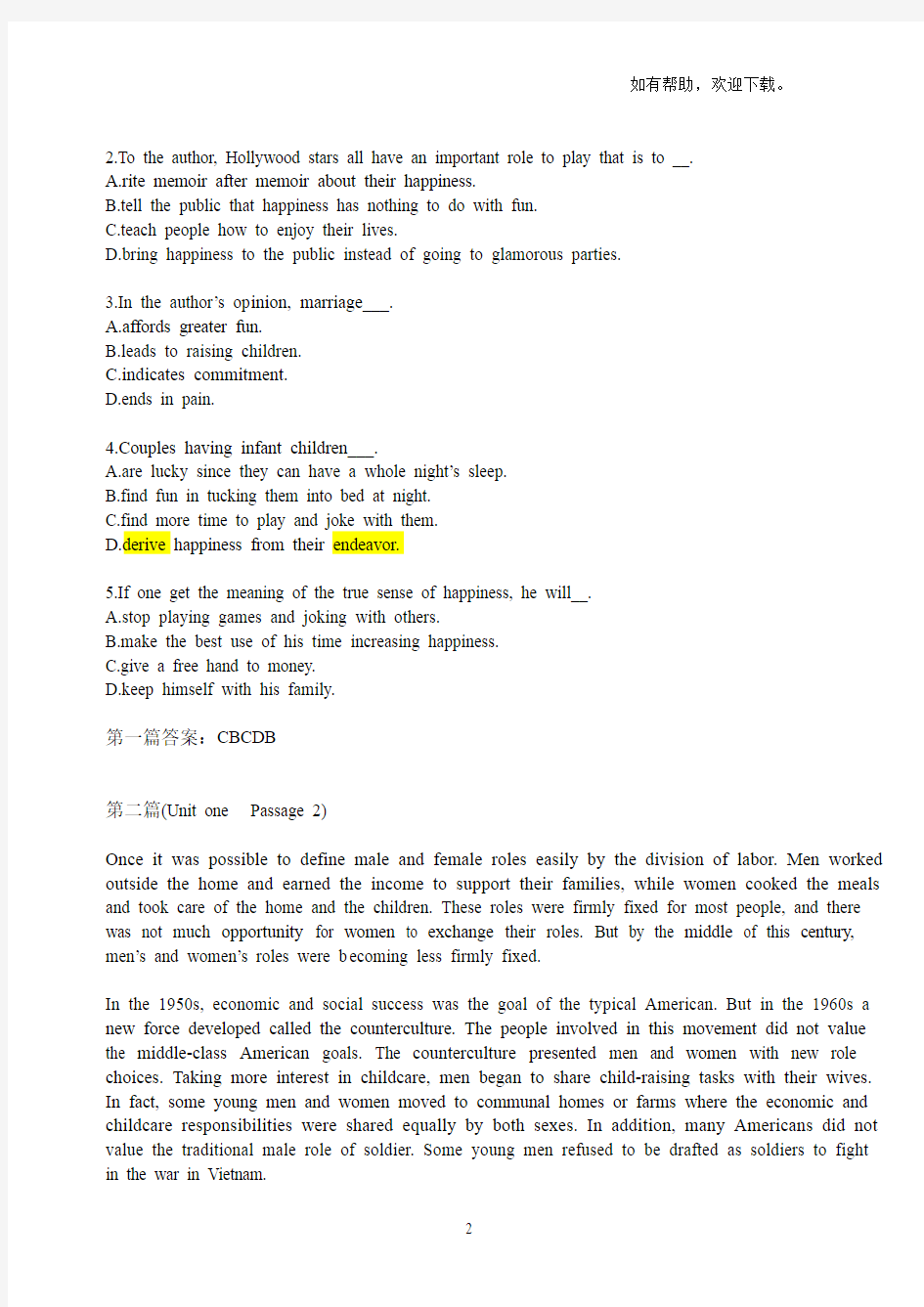

王长喜-六级考试标准阅读160篇
第一篇(Unit one Passage 1)
I live in the land of Disney, Hollywood and year-round sun. You may think people in such a glamorous, fun-filled place are happier than others. If so, you have some mistaken ideas about the nature of happiness.
Many intelligent people still equate happiness with fun. The truth is that fun and happiness have little or nothing in common. Fun is what we experience during an act. Happiness is what we experience after an act. It is a deeper, more abiding emotion.
Going to an amusement park or ball game, watching a movie or television, are fun activities that help us relax, temporarily forget our problems and maybe even laugh. But they do not bring happiness, because their positive effects end when the fun ends.
I have often thought that if Hollywood stars have a role to play, it is to teach us that happiness has nothing to do with fun. These rich, beautiful individuals have constant access to glamorous parties, fancy cars, expensive homes, everything that spells “hap piness”. But in memoir after memoir, celebrities reveal the unhappiness hidden beneath all their fun: depression, alcoholism, drug addiction, broken marriages, troubled children and profound loneliness.
Ask a bachelor why he resists marriage even though he finds dating to be less and less satisfying. If he’s honest, he will tell you that he is afraid of making a commitment. For commitment is in fact quite painful. The single life is filled with fun, adventure and excitement. Marriage has such moments, but they are not its most distinguishing features.
Similarly, couples that choose not to have children are deciding in favor of painless fun over painful happiness. They can dine out ever they want and sleep as late as they want. Couples with infant children are lucky to get a whole night’s sleep or a three-day vacation. I don’t know any parent who would choose the word fun to describe raising children.
Understanding and accepting that true happiness has nothing to do with fun is one of the most liberating realizations we can ever come to. It liberates time: now we can devote more hours to activities that can genuinely increase our happiness. It liberates money: buying that new car or those fancy clothes that will do nothing to increase our happiness now seems pointless. And it liberates us from envy: we now understand that all those rich and glamorous people we were so sure are happy because they are always having so much fun actually may not be happy at all.
1.Which of the following is true?
A.Fun creates long-lasting satisfaction.
B.Fun provides enjoyment while pain leads to happiness.
C.Happiness is enduring whereas fun is short-lived.
D.Fun that is long-standing may lead to happiness.
2.To the author, Hollywood stars all have an important role to play that is to __.
A.rite memoir after memoir about their happiness.
B.tell the public that happiness has nothing to do with fun.
C.teach people how to enjoy their lives.
D.bring happiness to the public instead of going to glamorous parties.
3.In the author’s op inion, marriage___.
A.affords greater fun.
B.leads to raising children.
C.indicates commitment.
D.ends in pain.
4.Couples having infant children___.
A.are lucky since they can have a whole night’s sleep.
B.find fun in tucking them into bed at night.
C.find more time to play and joke with them.
D.derive happiness from their endeavor.
5.If one get the meaning of the true sense of happiness, he will__.
A.stop playing games and joking with others.
B.make the best use of his time increasing happiness.
C.give a free hand to money.
D.keep himself with his family.
第一篇答案:CBCDB
第二篇(Unit one Passage 2)
Once it was possible to define male and female roles easily by the division of labor. Men worked outside the home and earned the income to support their families, while women cooked the meals and took care of the home and the children. These roles were firmly fixed for most people, and there was not much opportunity for women to exchange their roles. But by the middle of this century, men’s and women’s roles were b ecoming less firmly fixed.
In the 1950s, economic and social success was the goal of the typical American. But in the 1960s a new force developed called the counterculture. The people involved in this movement did not value the middle-class American goals. The counterculture presented men and women with new role choices. Taking more interest in childcare, men began to share child-raising tasks with their wives. In fact, some young men and women moved to communal homes or farms where the economic and childcare responsibilities were shared equally by both sexes. In addition, many Americans did not value the traditional male role of soldier. Some young men refused to be drafted as soldiers to fight in the war in Vietnam.